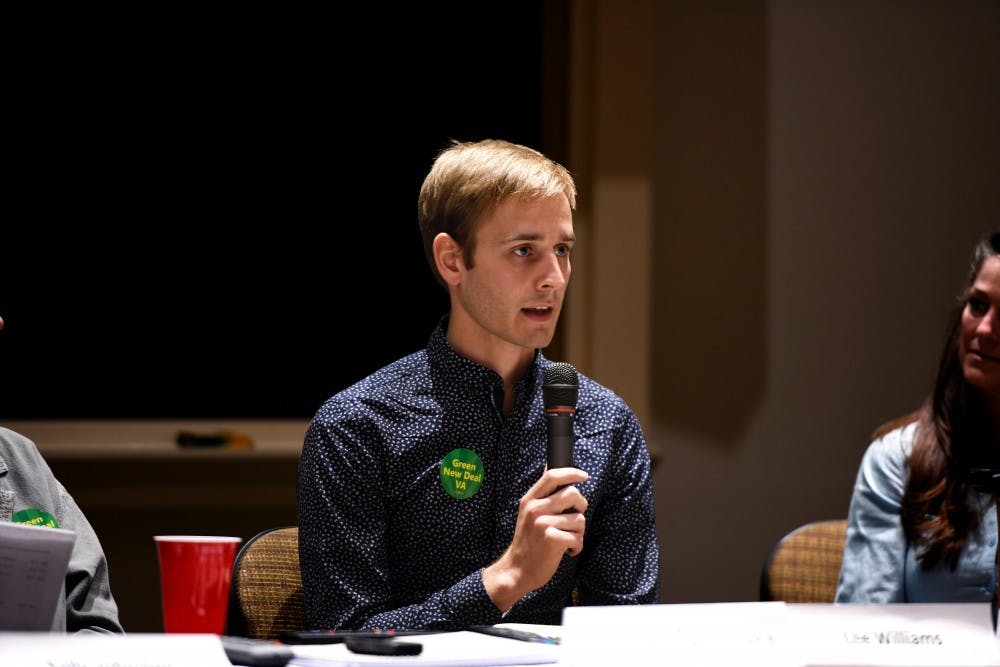Although the Jepson Hall auditorium held only a handful of students, many Richmond community members were present the night of April 25 to listen to a passionate conversation on climate change as it relates to faith.
Five climate change activists and people of faith spoke on a panel about the state of Virginia’s Green New Deal and how it related to their faiths.
The Virginia Green New Deal is a statewide proposal similar to Alexandria Ocasio Cortez' nationwide version first proposed in in the House of Representatives earlier this year. Both proposals seek to initiate sweeping action in response to climate change that would take place over the next 10 years.
The panel was organized by Victoria Williams, the president of the SEEDS Project and an intern for the activism group known as Virginia Interfaith Power & Light (VAIPL). VAIPL is the Virginia state chapter of Interfaith Power & Light, a national organization of religious peoples who are responding to global warming via the promotion of energy conservation, energy efficiency and renewable energy, according to their national organization’s website.
The panel's moderator, Faith B. Harris, is an assistant professor of theology at Virginia Union University, the director of its Edosomwan Center for Faith, Leadership and Public Life and a grassroots organizer of social justice campaigns, according to Virginia Union University.
Harris began by having the panelists introduce themselves and speak about why they became involved in environmental action.
Mary Finley-Brook, an associate professor of geography and the environment at UR, said that as both an environmentalist and a mother, she saw it as her duty to further the discussion on the environment and climate change.
Finley-Brook, who was recently hand-picked by Gov. Ralph Northam to be a member of the statewide Advisory Council on Environmental Justice, said she wanted people to understand that renewable energy was not as expensive as many politicians made it seem.
Instead, Finley-Brook said, legislation such as the “Dominion Tax” was what was truly costing tax payers. The "Dominion Tax" is what Virginia activist groups believe to be unnecessary costs on energy bills from Dominion Energy.
Richard Walker, another panelist, is the CEO of Bridging the Gap in Virginia, an organization that works with former felons to stop the cycle of recidivism and incarceration in Virginia.
Walker talked about the lack of action he has seen from the Virginia government which he said has not yet taken basic steps to address environmental racism. Walker said his family had been personally affected by the Dominion Energy Atlantic Coast Pipeline, which has torn through multiple low-income and minority Richmond communities, including Union Hill.
“The Lord said to have dominion over the earth," Walker said. "He did not say Dominion Energy all over the earth.”
Enjoy what you're reading?
Signup for our newsletter
Harris asked the panel about the role of religion in the conversation surrounding climate change.
Sally Johnson, an educator and active member of her church community, used this question to address what she sees as the many misconceptions surrounding the role of faith in this discussion. Some of those misconceptions include the idea that many believe faith and religion have propelled a disbelief in science and a denial of the scientific consensus on climate change, she said.
Johnson said she believed that religion, viewed for its innate values of helping one another and respecting what the higher power gave you, should do everything to help the environment and continue the conversation on climate change. But she believes that faith has been perverted by many politicians and climate deniers to justify inaction.
Avery Lamb, federal policy associate at Interfaith Power & Light, also believed religion was partly to blame for the denial of climate change. He said that although religion had conflicted with science in the past, it was now time to realize that "scientists are modern prophets."
"It is time to align truth and science," Lamb said.
When discussing the Green New Deal proposal, Virginia Green New Deal co-chair Lee Williams said: "It is a great proposal. But it is just that – a proposal."
A proposal does not create change or restrict the companies that have been taking advantage of the lack of environmental policies across the nation, Lee Williams said.
The other panelists all nodded their heads in agreement.
In her final statements, Lee Williams said that she hoped to see more action from students and youth groups like The Sunrise Movement, a national organization of young people working to create solutions to climate change that will help job growth and stimulate the economy.
Lee Williams noted that although James Madison University, Virginia Commonwealth University and William & Mary have on-campus Hubs – local chapters of The Sunrise Movement – UR does not. She said she hoped that UR would join with other universities and youth nationwide in starting a Hub on campus that would work to enact political action on climate change.
Contact news writer Eli Kline at eli.kline@richmond.edu.
Support independent student media
You can make a tax-deductible donation by clicking the button below, which takes you to our secure PayPal account. The page is set up to receive contributions in whatever amount you designate. We look forward to using the money we raise to further our mission of providing honest and accurate information to students, faculty, staff, alumni and others in the general public.
Donate Now



